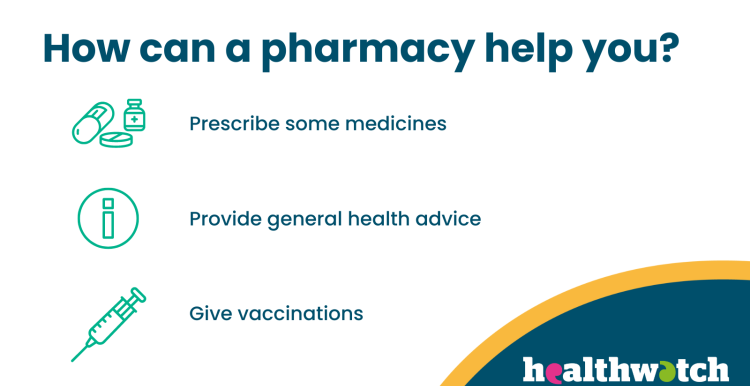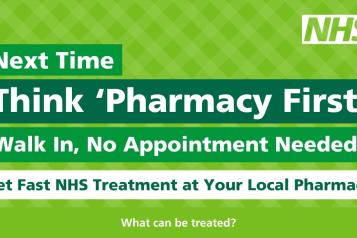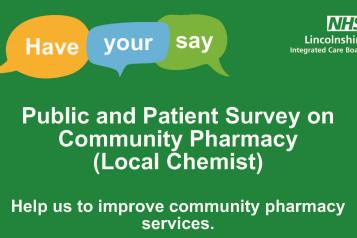How can your pharmacy help you?

Pharmacists are qualified healthcare professionals who can offer clinical advice and over-the counter medicines for a range of minor illnesses. They also work with other healthcare professionals, such as doctors and nurses, to get you the best possible care in a way that works for you and the NHS.
The pharmacist will let you know if you need to visit a doctor, but they can help you with a number of things first.
Can a pharmacist prescribe medication?
Pharmacists can offer advice and over-the-counter medication to help with a range of common conditions and minor injuries such as:
- Common ailments such as coughs, colds and the flu
- Tummy trouble
- Aches and pains
- Skin rashes
- Cystitis
- Access to the morning after pill and pregnancy tests
Your pharmacist can help manage repeat prescriptions and help with any questions that you might have about medication that you have been prescribed by the doctor.
You can also only buy certain products classified as 'pharmacy medicines' from a pharmacist. These medicines, also called 'pharmacy-only medicines' are not usually displayed on open shelves.
Find your nearest pharmacist
Not sure where your nearest pharmacist is? Enter your postcode to find a pharmacy near you, including high-street retailers, supermarkets and independent pharmacies.
Do I need to see the doctor every time I need a prescription?
Not necessarily, your pharmacist can help manage repeat prescriptions for you. If you take medication on a regular basis and your condition is stable, your GP may be able to offer a long-term repeat prescription.
Can pharmacists provide advice about medication I’m taking for a long-term condition?
Yes, you can feel free to ask your pharmacist for advice about any of your medicines.
If you have been prescribed medication to treat a long-term condition for the first time, you may be able to get extra help and advice from your pharmacist. This scheme is called the New Medicine Service and applies to health conditions such as Parkinson’s Disease, heart failure and stroke.
People often have problems when they start a new medicine. The pharmacist will support you to use your medicine safely and to the best effect.
This service is only available to people using certain medication – speak to your pharmacist to check.
Who do I turn to about general advice for my health and wellbeing?
You can visit your pharmacist instead of your GP about how best to keep you and your family well. They’ve all sorts of advice, from how to eat healthily, quit smoking, lose weight, and what type of exercise you could be doing.
What other services do pharmacists offer?
Your local pharmacist might also offer other NHS services such as smoking cessation, blood pressure tests, weight management and flu and Covid vaccination. To find out what your community pharmacist offers, just ask them.
Some pharmacists are also trained to spot people at risk of hypertension. If they think you are at risk, they will offer you a blood pressure test. The results will be shared with your GP so you can discuss any treatment you might need as a result. If you have very high blood pressure, you will be urgently referred to see your GP within 24 hours.
I’ve just been discharged from hospital, how can pharmacists help me?
If you have been prescribed new medication while in hospital, they can refer you to a pharmacy for extra help and guidance. The pharmacy will check any changes in the quantity, dosage or frequency of your medication, as well as compare and review any new medicine with anything you were prescribed before you were in hospital.
The pharmacist will have a confidential chat with you to talk about the medication, any changes and to ensure you know how the drugs should be taken.
What training do pharmacists have?
All pharmacists train for five years in the use of medicines. They are also trained in managing minor illnesses and providing health and wellbeing advice.
Is a chat with my pharmacist confidential?
Many pharmacies have a private consultation room where you can discuss issues with pharmacy staff without being overheard. Ask them if you would like to talk in private.
More information
For more information, or for a large print or easy read guide please visit the NHS website.
You can also watch this British Sign Language (BSL) video guide to find out how a pharmacist can help.
Other services that can help you find the right treatment
-
NHS 111 They can advise whether a trip to the pharmacy, doctors or A&E is the most appropriate for you. They can also book timeslots at services like A&E. Just call 111 or visit their website.
- A&E If you are in need of urgent medical care call 999 or go to your nearest A&E department. Find your nearest A&E services.
Tell us about your experience of care
Has your care been disrupted by COVID-19 and its impact on health and social care services? Whether it’s good or bad, we want to hear from you.
It only takes five minutes and your feedback can help NHS and social care services understand the steps they can take to improve care for you and your loved ones.


